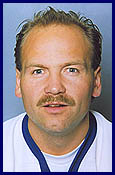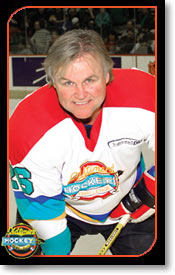
Crabby Joes Invitational Celebrities
(Add a "Hockey Legend" to your Group!)
Players will have the opportunity to support "Shoot for a cure - Spinal Cure" by bidding on our Hockey Legends Celebrity players! We will be auctioning off the ability to play with a "Hockey Legend". The group that offers the largest donation to "Shoot for a cure" will be able to play with Wendel Clark, Wilf Paiement or Tony Currie! (Largest donation gets "Hockey Legend choice" in your foursome!)

Wendel Clark
Wendel Clark was one of the most popular
and beloved players to ever wear a Maple Leaf sweater. He was loved by Leaf fans
because of what he brought to the rink every single game: he could score goals
with a deadly wrist shot; he could throw thunderous bodychecks that would lift
the crowd off its feet; and he was one of the most feared fighters in the NHL in
the 1980s. He also had a genuine love of the game which he showed through his
all-out, determined style of hockey, which ultimately cut short his promising
career.
Wendel Clark was born on October 25, 1966 in
Kelvington, Sask. He was part of a hockey environment, having followed in the
path of his cousins Joe Kocur and Barry Melrose. He first gained attention at
the 1985 World Junior Championships when he scored an important goal that helped
Canada gain a gold medal and he also made his presence felt with his timely
hitting.
The 1985 NHL draft was held in Toronto for
the first time and also for the first time the hometown Leafs would have the
first pick. There was heavy pressure on the team, especially GM Gerry McNamara,
to not make a mistake since the Leafs had been notorious in the past for their
poor record in the draft, particularly in the first round. After much
speculation that the Leafs were considering taking talented forward Craig
Simpson, the Leafs surprised their fans by taking Clark from the Saskatoon
Blades. The Leafs drafted him as a defenseman, but he was immediately switched
to left wing, where he played for most of his career. Right from his first game,
it became obvious to anyone who watched him play that this time the Leafs had
not made a mistake.
In his rookie season, Clark electrified fans
with his play and gave every indication of being a future star. He scored 34
goals, which broke the club record for most goals by a rookie. For his efforts,
he was named to play in the 1986 All-Star Game where he briefly skated on a line
with Wayne Gretzky and Jari Kurri. At the end of the season, he was named as the
NHL's best rookie by both The Hockey News and The Sporting News, but the big
prize--the Calder Trophy--would elude him. He finished well back in the final
voting behind the eventual winner Gary Suter, whom many Leaf fans felt had
stolen the award from Clark and didn't deserve it. Clark had to settle for being
named to the NHL's All-Rookie Team, which was the only individual honour that he
would win during his career.
The next season, 1986-87, would be even
better. He would better his rookie goal total by scoring 37 times and he also
picked up 271 PM, which served notice to all opponents that he would take on all
challenges and would not back down from anybody. He also played in all 80 games
but it would be the only time in his career that he would play a full
injury-free season. His injury troubles began before his third season when Clark
hurt his back while trying out for Team Canada's 1987 Canada Cup team. He was
ultimately cut from the team by coach Mike Keenan, a decision which proved
unpopular with fans in Southern Ontario who booed Keenan strongly when the team
played its first home game in Hamilton. During the next 3 seasons Clark played
only 81 games as his back problems got worse and he could not help his Leafs as
they faced some difficult seasons ahead.
In 1990-91, Clark was introduced to Chris
Broadhurst, who became his full-time physical therapist and personal trainer and
later, after being impressed with his work with Clark, he was hired by the Leafs
as the team's full-time therapist. Although he still received his share of
injuries, the back problems were behind him and he would lead the Leafs to their
best seasons since the late 1970s. In 1991 he was named captain of the Leafs, a
decision which was a popular one with fans and players alike. As captain, he led
the Leafs to 2 semi-final appearances in 1993 and 1994 and set a team record
with most career playoff goals with 33.
In 1994, the Leafs felt that they had made
great strides in becoming Stanley Cup contenders and they needed a few more
pieces to finally win it all but in order to get those missing pieces they
sacrificed their team leader. To the shock of many die-hard fans, on the
afternoon of the NHL draft on June 28, 1994, Wendel Clark was traded to the
Quebec Nordiques along with Sylvain Lefevbre and Landon Wilson in exchange for
Garth Butcher, Todd Warriner, and Mats Sundin, whom management was counting on
to be the team's next leader. The two teams also exchanged first round draft
picks in the deal. Ironically, Clark had been coming off his best season as a
Leaf, scoring 46 goals in 64 games, but it was the intangibles that he brought
to the rink that the fans would miss. Eventually, the loss of Clark proved so
great that management brought him back through trades on two separate occasions,
and, fittingly, his final game was played as a Leaf in May of 2000. Clark now
works for the Leafs as a goodwill ambassador, where he stays in touch with his
legions of fans, who will never forget him.

Wilf Paiement
The young Wilf Paiement played his minor hockey in Northern Ontario until he was surprised by his high school principal who informed him that, according to the Globe & Mail, he'd just been drafted #1 by the Niagara Falls Flyers of the OHA.
He joined the Flyers the following year but found the cultural difference too great to handle at age 16. He returned home for a time and finally rejoined the club just as it was sold to Sudbury. All of the team's equipment and players were part of the deal except Wilf Paiement. Hap Emms retained his rights and, to Paiement's chagrin, sent him to St. Catharines where he played out his junior career as a prolific two-way player.
In 1974, he was chosen 2nd overall in the NHL Amateur Draft by the expansion Kansas City Scouts. The team's lineup was weak, but Paiement played a solid two-way game, establishing himself as a scorer who, like his older brother, could fight very effectively.
Two seasons later, the Scouts transferred their franchise to Colorado where Paiement skated for their new incarnation as the Rockies. There, he continued to be a team leader until he was whisked away to Toronto for the popular Lanny McDonald.
With the Leafs, Paiement achieved his highest single-season point totals, netting 40 goals and 57 assists in 1980-81. A season-and-a-half later, however, he moved on the join a strong Nordiques lineup that made effective use of his robust play, during the days of their great "Battle of Quebec" against the Canadiens.
By 1986, injuries began to take a toll on his performance as he made brief stops with the Rangers, Sabres and Penguins. He finally left the NHL in 1988 to play 28 games with Muskegon of the IHL before retiring from hockey.

Tony Currie
Tony Currie was selected by the St. Louis Blues in the third round of the 1977 NHL Amateur Draft, 63rd overall, from the WHL's Portland Winter Hawks.
He spent three years in Edmonton and showed marked improvement each season. In his first year with the Oil Kings, Currie admitted he was nervous and just looking to fit in with the club. In 22 games, he had just a single assist while seeing limited ice time. The following year, he scored 28 goals and 45 points in 39 games. That set up a great final year in which he had 41 goals and 81 points in 71 games. As a 19-year-old veteran, Currie joined the Portland Winter Hawks, and lit the lamp on 73 occasions in just 72 games, finishing with 125 points.
The 1977-78 season was Currie's first as a pro. He appeared in 22 games for the Blues, scoring four goals and nine points. In 1980-81, Currie had his best year in the NHL, scoring 23 goals and 55 points for the Blues in 61 games.
Midway through the 1981-82 season, Currie was sent to the Vancouver Canucks, where he played for just 20 games before being sent to the Hartford Whalers, where his NHL career ended in 1984-85. He continued to ply his trade in the minors and then in Europe for another five years before retiring from Varese of the Italian League in 1990.
In 290 NHL games, Currie had 92 goals and 119 assists for 211 points.